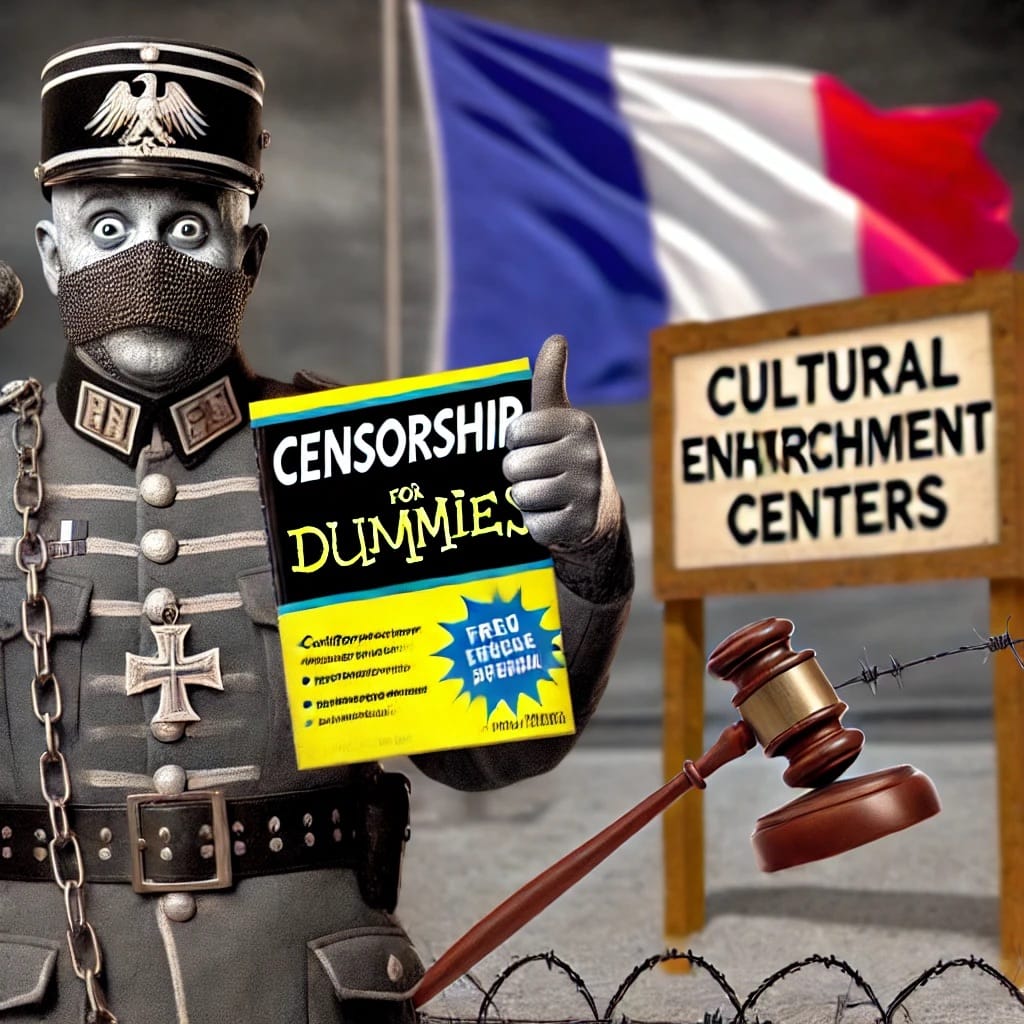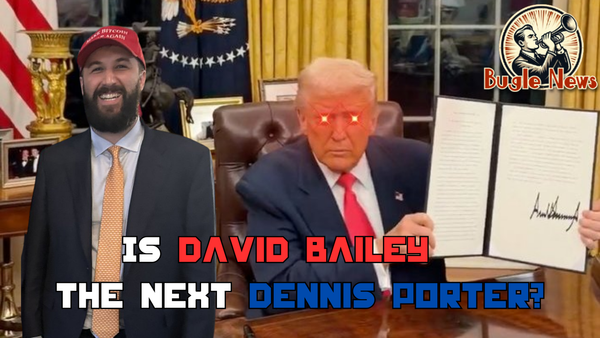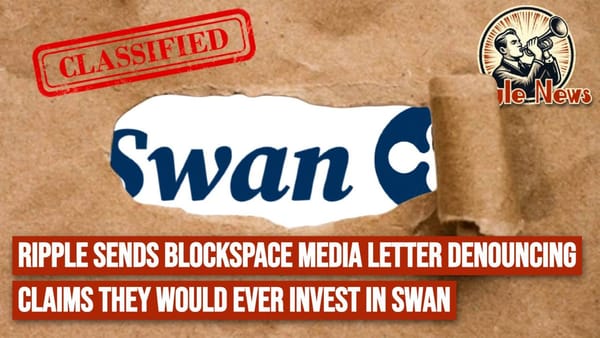Macron Pledges to Return France to the Glory Days of Vichy Governance

PARIS, August 24, 2024 — In a stunning bid to rekindle the halcyon days of Vichy France, President Emmanuel Macron has set his sights on bringing back what he calls "the golden era of governance." The first step in this illustrious campaign? The arrest of Pavel Durov, the CEO of Telegram, at a French airport, heralding the dawn of a new age of state-sponsored censorship. The world watched in a mixture of shock and bemusement as French authorities carted away the soft-spoken tech mogul, whose crime was apparently advocating for that most dangerous of Western values—free speech.
In a press conference dripping with both self-righteousness and nostalgia, Macron declared, "The time has come to reclaim our nation’s greatness by enforcing the principles that once made us a beacon of order and discipline in a chaotic world. France must return to the values that brought us together under a strong, centralized government—one that did not flinch from its duty to protect its citizens from the dangers of unfettered expression."
One could be forgiven for thinking that Macron, a man known more for his penchant for expensive tailor-made suits than for jackboots, had suddenly become possessed by the spirit of Marshal Philippe Pétain. Indeed, Macron’s sudden enthusiasm for the virtues of Vichy has raised eyebrows across Europe, with Thierry Breton, the European Union’s self-appointed Censorship Obergruppenführer, nodding approvingly from his Brussels headquarters. Breton, who has become the poster child for the EU’s war on free speech, reportedly sent Macron a congratulatory basket of Bordeaux wine and brie, accompanied by a handwritten note: "Welcome to the club. The past is the future."
The arrest of Durov marks a significant escalation in Macron’s crusade against digital dissent. Durov, whose app Telegram has been a thorn in the side of authoritarian governments worldwide, was reportedly apprehended while attempting to board a flight to Switzerland. His offense? Providing a platform for individuals to exchange ideas without the prying eyes of government censors. This affront to the principles of European governance was simply too much for Macron to bear.
"France is a nation of laws, and those laws must be respected," Macron continued, as he polished his newly acquired baton of authoritarianism. "We cannot allow individuals to undermine our society by promoting unchecked dialogue. Freedom of speech is a dangerous concept, one that must be tightly controlled if we are to preserve the moral fabric of our nation."
Of course, one must admire Macron’s commitment to historical accuracy. By invoking the legacy of Vichy France, he reminds us that this is not the first time France has sought to "preserve" its values by silencing dissent. In a masterstroke of irony, Macron appears to have forgotten—or perhaps chosen to ignore—that the Vichy regime’s efforts to quash free expression did not exactly end well. But who are we to question the wisdom of a man who has evidently studied history with such an idiosyncratic lens?
Meanwhile, Thierry Breton has wasted no time in lending his support to Macron’s campaign. In a recent statement, Breton praised Macron for his "bold and necessary" actions. "The arrest of Pavel Durov is a clear signal to all who would challenge the authority of the state," Breton remarked, presumably while adjusting his monocle. "We must not allow these so-called 'free speech advocates' to spread their dangerous ideas. It is our duty to protect the citizens of Europe from the horrors of unregulated thought."
Breton’s words are a chilling reminder that the European Union, under his watchful eye, is steadily marching toward a future where free speech is but a quaint relic of a bygone era. The Commissioner’s recent threats against Elon Musk, owner of X (formerly Twitter), underscore this trend. Breton’s ongoing battle with Musk, another advocate for free speech, has turned into a public spectacle that might be mistaken for a satire in itself—were it not for the fact that it’s all too real.
As for Durov, his fate now hangs in the balance as French authorities debate whether to charge him with sedition, treason, or the more nebulous crime of "undermining the state." In a statement issued from his jail cell, Durov expressed disbelief at his arrest. "I never imagined that France, the birthplace of the Enlightenment, would imprison someone for advocating free speech," he said, his voice tinged with the bewilderment of a man who has just realized that he’s stepped into a Kafka novel.
Amidst the global backlash, there was one particularly surprising reaction: a statement from none other than Russian President Vladimir Putin, who, with an air of barely concealed amusement, announced that Russia is now excited to surpass France in freedom of speech. "We considered arresting Pavel Durov ourselves, but we ultimately decided that the right to free speech was too important to infringe upon," Putin stated, his eyes gleaming with what could only be described as schadenfreude. "It seems that France has taken the lead in the race to the bottom when it comes to freedom of expression. We in Russia are eager to observe this development and, who knows, perhaps even learn from it."
Putin’s statement sent shockwaves through the international community, leaving many to question whether the world had indeed turned upside down. When Russia, a nation not exactly known for its tolerance of dissent, starts lecturing France on the importance of free speech, one might wonder if Macron’s France has truly outdone itself in the theater of the absurd.
Macron, however, remains unfazed by the international outcry that has erupted in the wake of Durov’s arrest. "We must not be swayed by the opinions of foreign agitators," he declared, channeling the spirit of autocrats past. "France is a sovereign nation, and we will govern ourselves as we see fit. The opinions of others are irrelevant when it comes to preserving the sanctity of our state."
Indeed, Macron’s vision for France seems to be one where dissent is not merely discouraged but actively punished. In a move that has left many wondering whether satire has finally become reality, Macron has reportedly ordered the construction of a new series of reeducation camps—sorry, "cultural enrichment centers"—where those guilty of thought crimes can be gently guided back to the path of state-approved thinking.
But it’s not all grim news. Macron’s bold actions have inspired a new wave of European leaders to consider their own Vichy-esque reforms. Across the continent, politicians are now clamoring to introduce similar measures in their own countries, each eager to prove their loyalty to the grand project of European unity. After all, what could be more unifying than a continent-wide crackdown on the dangerous idea of free speech?
As France enters this new chapter in its history, one can’t help but wonder where it will lead. Will Macron succeed in his quest to restore the glory of Vichy governance? Or will the French people rise up, as they did in 1789, to reclaim their liberté from the hands of those who would suppress it? Only time will tell. But one thing is certain: the world is watching, and it’s laughing—or perhaps crying—at the absurdity of it all.
As for Macron, he remains steadfast in his determination to see his vision through to the end. "History will judge us," he proclaimed as he exited the press conference, "and it will judge us kindly." One can only hope that history, like satire, retains its sharpness in the face of such audacious attempts at revision.






